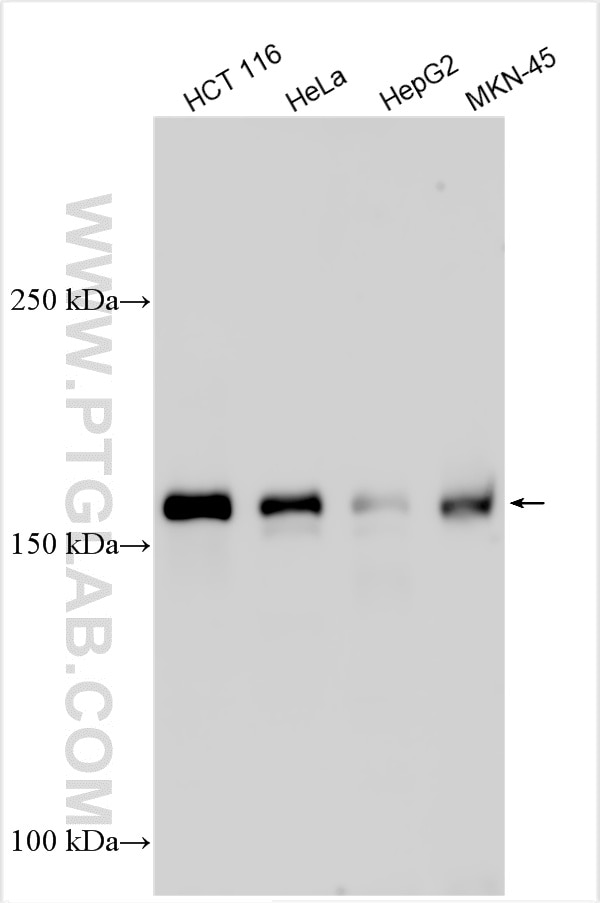PTPRF Polyklonaler Antikörper
PTPRF Polyklonal Antikörper für WB, ELISA
Wirt / Isotyp
Kaninchen / IgG
Getestete Reaktivität
human
Anwendung
WB, ELISA
Konjugation
Unkonjugiert
Kat-Nr. : 14138-1-AP
Synonyme
Geprüfte Anwendungen
| Erfolgreiche Detektion in WB | HCT 116-Zellen, HeLa-Zellen, HepG2-Zellen, MKN-45-Zellen |
Empfohlene Verdünnung
| Anwendung | Verdünnung |
|---|---|
| Western Blot (WB) | WB : 1:500-1:1000 |
| It is recommended that this reagent should be titrated in each testing system to obtain optimal results. | |
| Sample-dependent, check data in validation data gallery | |
Produktinformation
14138-1-AP bindet in WB, ELISA PTPRF und zeigt Reaktivität mit human
| Getestete Reaktivität | human |
| Wirt / Isotyp | Kaninchen / IgG |
| Klonalität | Polyklonal |
| Typ | Antikörper |
| Immunogen | PTPRF fusion protein Ag5374 |
| Vollständiger Name | protein tyrosine phosphatase, receptor type, F |
| Berechnetes Molekulargewicht | 1898 aa, 212 kDa |
| Beobachtetes Molekulargewicht | 175 kDa-200kDa |
| GenBank-Zugangsnummer | BC048768 |
| Gene symbol | PTPRF |
| Gene ID (NCBI) | 5792 |
| Konjugation | Unkonjugiert |
| Form | Liquid |
| Reinigungsmethode | Antigen-Affinitätsreinigung |
| Lagerungspuffer | PBS with 0.02% sodium azide and 50% glycerol |
| Lagerungsbedingungen | Bei -20°C lagern. Nach dem Versand ein Jahr lang stabil Aliquotieren ist bei -20oC Lagerung nicht notwendig. 20ul Größen enthalten 0,1% BSA. |
Hintergrundinformationen
PTPRF (Protein Tyrosine Phosphatase Receptor Type F) is a receptor protein tyrosine phosphatase, also known as LAR. PTPRF is a transmembrane protein with extracellular domain, transmembrane domain and two intracellular catalytic domains in series. It is located in the cell membrane and participates in the interaction between cells or cell matrix. It is widely expressed in many tissues, including fat, skin, heart, lung, liver, kidney, pancreas, small intestine, colon, brain, skeletal muscle, spleen, peripheral white blood cells and so on. The protein plays an important role in regulating a variety of cell processes, including cell growth, differentiation, mitotic cycle and carcinogenic transformation. In the insulin-responsive tissues of obese and insulin-resistant individuals, the expression level of PTPRF is increased, which may contribute to the pathogenesis of insulin resistance. PTPRF showed expression changes in many cancers, such as breast cancer, thyroid cancer, non-small cell lung cancer and so on. In gastric adenocarcinoma, PTPRF, as a new tumor suppressor, plays a role by inactivating ERK1/2 signaling pathway (PMID: 32973331). The total length of the protein is 175-200kd, and after cutting, it forms 125-150 and 80-85kd,70 and 72kDa fragments (PMID: 1547787, PMID: 17259169).
Protokolle
| PRODUKTSPEZIFISCHE PROTOKOLLE | |
|---|---|
| WB protocol for PTPRF antibody 14138-1-AP | Protokoll herunterladen |
| STANDARD-PROTOKOLLE | |
|---|---|
| Klicken Sie hier, um unsere Standardprotokolle anzuzeigen |


